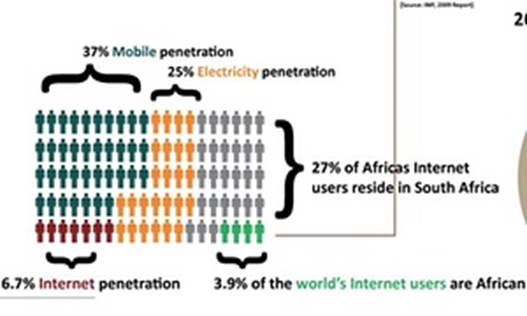Is Africa leading the innovation revolution?

"We are seeing a trend of being technology generators rather than just adopters." Image: REUTERS/Akintunde Akinleye
Necessity is the mother of invention, and in Africa it has been the mother of innovation. While the continent is vastly different, the level of innovation has been interesting to watch, largely fueled by the equalizing nature of technology and mobile telephony.
Over the last 15 years, African economies have enjoyed growth above the global average. This has largely been fuelled by mineral agriculture, with growth linked to China’s demand for raw materials. While this demand from China is now slowing down, the rise of African countries is a new story.
It is estimated that in 2016, the African population will reach 1,069 billion people, the majority of whom are under 30. Africa has the highest rates of urbanisation; its poor infrastructure, which has previously hampered growth and development, is now a catalyst for innovation. The mobile phone in Africa has become a game-changer for the continent. According to Ericsson, the technology company, by 2019 there will be 930 million mobile phones in Africa, almost one for every person on the continent. There is greater mobile penetration than electricity penetration. Now, people are able to connect, get news, trade, get access to healthcare and even transfer money.

(In Africa, mobile phone penetration is higher than electricity penetration. Graphic by Jon Gosier of Appfrica Labs Public Domain, The Guardian)
One of the biggest innovations to come out of Africa is mobile money transfer, which has disrupted traditional financial models. The technology behind it has now been exported to the West. The continent is starting to see the rise of e-healthcare solutions and online education solutions, two of the biggest challenges on the continent.
For the first time, we are seeing a trend of being technology generators rather than just adopters, and we are seeing more innovators from the west move to the continent due to an easier, and in some cases non-existent, regulatory environment, which enables greater experimentation in the market with few competitors. These include new drone technology for the delivery of goods to leapfrog the infrastructure divide.
Overall, there seems to be good news for the continent, as Africa looks to technology to catalyse new areas of growth, a good example being East Africa, with Rwanda and Kenya in particular championing the need for an enabling environment.
“We need to ensure women are part of this revolution”
However, as the technology and innovation boom hits Africa, there is still a gender divide, and we need to ensure that women and girls are part of this revolution. It’s a prime opportunity to use technology as a catalyst to create inclusive economies, and income inequality. There is a need to create gender-inclusive technology and have women become part of the design and development of technological solutions. There are many programs on the continent leading this charge, and there is an opportunity for Africa to become a leader in gender equality in the technology sector.
The other challenge for Africa is to preserve its ecosystems, which have been under threat due to rapid urbanisation and economic development at the expense of the environment. The latest WWF African Ecological Futures Report makes it clear that we are at a pivotal moment in our development trajectory to balance growth with conservation.
It is an exciting time for the continent. Under the Africa rising narrative, in the coming years we will witness how technology can transform the way Africa works and revolutionising the continent.
Author: Naadiya Moosajee is a civil engineer and the Co-Founder of WomEng, a South African non-profit which trains women as engineers. She is a Global Shaper with the Cape Town hub. She is participating in the World Economic Forum’s Annual Meeting in Davos.
Don't miss any update on this topic
Create a free account and access your personalized content collection with our latest publications and analyses.
License and Republishing
World Economic Forum articles may be republished in accordance with the Creative Commons Attribution-NonCommercial-NoDerivatives 4.0 International Public License, and in accordance with our Terms of Use.
The views expressed in this article are those of the author alone and not the World Economic Forum.
Stay up to date:
Innovation
Related topics:
Forum Stories newsletter
Bringing you weekly curated insights and analysis on the global issues that matter.
More on Forum in FocusSee all
Gayle Markovitz
October 29, 2025







